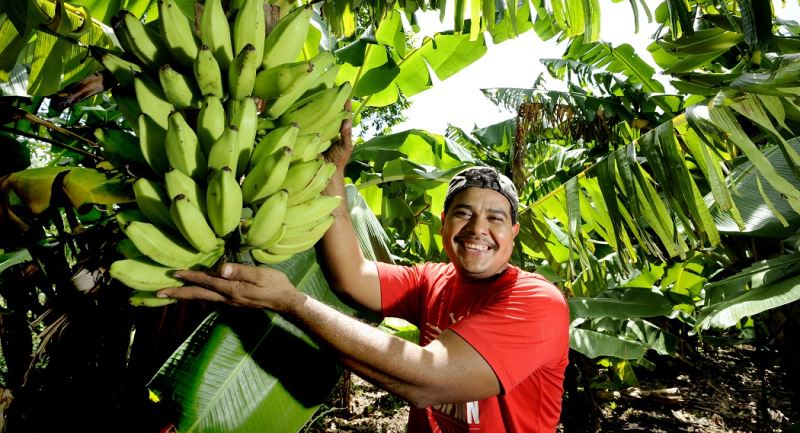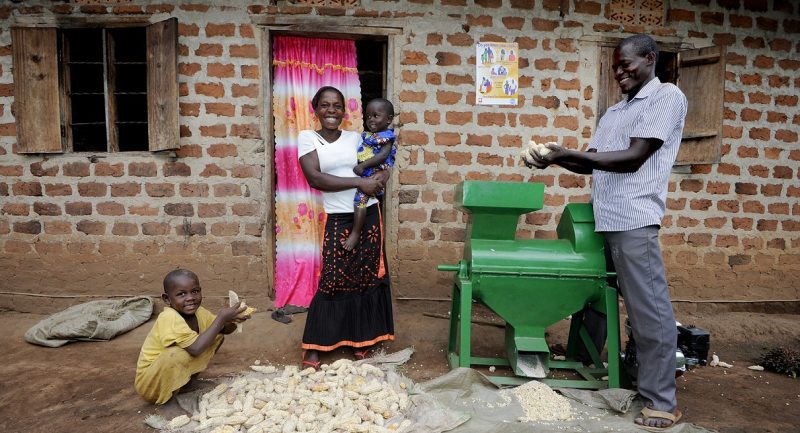Small steps, big changes
10 October 2019

Ensuring our poorest brothers and sisters in the world have enough to eat, are able to support themselves in the long term and live a life with dignity is central to the teachings of the Church. Laura Hamilton examines how your support for some of the poorest people in the world helps them grow more food and earn a living.
Across the world tonight, one in nine people will go to bed hungry. That means 821 million people don’t have enough to eat, roughly 150 times the population of Scotland.
This is a staggering statistic, and one that inspires us all to act. Thanks to your support, together we’re working with people in some of the poorest countries in the world. Each community has its own unique challenges, and those living there all face different problems.
We work with them alongside our local partners to identify what support they need to overcome the problems they face and become self-sufficient in the long term.
Seeds, tools and training
More than a quarter of the world’s population earn their living through small-scale farming, and as a result a large proportion of our work is focused on equipping many of the poorest people in the world with the seeds, tools and training they need to grow more food.
Many are already being hit by the harmful effects of climate change, including more frequent and severe storms and floods, together with increasingly unpredictable seasons making it hard for families to know when to plant and harvest their crops. Helping people to grow different varieties of crops and diversify their income are important ways to help people cope.
Establishing seed banks is another way to increase food security so farmers can recover if their crops are destroyed. Seed banks act like an insurance policy and provide a safe place for local people to store and exchange their best seeds in areas vulnerable to failing harvests.
In the village of La Chorrera in Nicaragua, with support from the EU and the Big Lottery Fund we worked with our local partner CANTERA to set up a seed bank, and provide training and support to farmers so they could diversify their crops.
Michael Alfredo Aburto has seen a total transformation in his six acres of land since he started receiving that help. Before, the 41-year-old father of one couldn’t guarantee his family would have enough to eat, but now things are different.
"I don’t need to buy my son food from the market, I can give him food from the farm. I know my son is eating fresh, good food."

Working Together
Support in the community is key to making projects like these a success. In rural areas, families don't develop their farms in isolation, but live side-by-side with their neighbours and wider family.
Community support networks, like savings and loans groups or farmers’ co-operatives can help families build up their assets, get more for their produces and access loans in emergencies or to reinvest in their businesses.
Michael was the first in his area to start a farm, but he has since inspired others to do the same. Now, fifty other families are following his example – that’s almost half the community.
Thriving, not just surviving
In Africa, where around 62%* of people live in rural areas, farming is the only option for many people to earn a living.
We’re working with our local partner in Uganda, Caritas Lugazi, to help vulnerable young people grow more food to feed their families, and then sell the surplus.
This means providing farm tools and seeds along with training in sustainable farming. The young people also receive continued support and guidance to ensure their crops thrive.

Amos, Rubinah and their children Justine and Carro, with their community maize machine in Uganda, supported by SCIAF partner Caritas Lugazi.
Father John Lule, the Director of Caritas Lugazi, says the impact of this project has been profound.
"There used to be many cases of people who couldn’t afford to eat. But now, because of our interventions and training, we’re seeing this change. People who didn’t smile are now smiling because they have a meal. They have a roof over their head. People who had given up on life have changed their attitude."
Breaking down barriers
Farming is not the only way we help people to become self-sufficient.
Vocational training in areas like tailoring, metal work, building and carpentry provides young people with the skills they need to find a good job or start their own business.
Promoting the rights and well-being of women is key to improving the health and prospects of families in poor communities. In Malawi, we’re helping young women break into previously male-dominated industries. Today Chilesto Moyo can make tables, beds, gates, door frames and many other metal products. The 21-year-old is now an apprentice welder, having completed a six month course at a technical college. She was part of a project aiming to improve the economic prospects of vulnerable young people.
"Today I can dream again of a brighter future as I am planning to establish my own business."
Finding appropriate solutions
In Cambodia, the answer to more financial security for some families is fish.
Married couple Yin Hon and Mai Kek once struggled to support themselves and their children. Working with our local partner, DPA, they received 450 catfish and a freestanding fish pond so they could start a fish farm. Now their lives have changed for the better, for good.
"We sell fish to neighbours and use some of the money to buy meat. The extra cash also comes in useful to buy school supplies for the children. We eat much better now thanks to the additional protein we get from the fish."
While our work differs from country to country, and even community to community, the common thread is that we give people a hand up, not a hand out. It is about helping people to help themselves so they can be self-sufficient in the long term and live a life with dignity.
This is only possible because of your fantastic support. Thanks to you, fewer people all around the world are going to bed hungry tonight. Great progress is being made in eradicating global poverty, but for now, we must continue to work together to help the poorest amongst us not only survive, but thrive.
*UN FAO
Back to